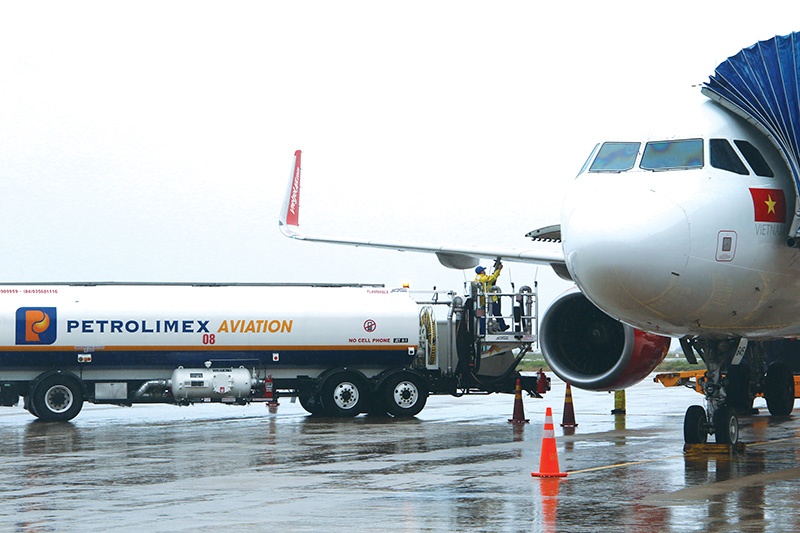Fresh woes for airlines in fuel costs
 |
| Airlines are gearing up for a full reopening of the skies this month, photo Le Toan |
The Ministry of Finance (MoF) on March 10 finalised a draft resolution on decreasing the environmental protection tax for fuel after consulting with the Ministry of Industry and Trade and other ministries and agencies to partly ease difficulties for people and businesses.
Under the draft resolution to be submitted to the National Assembly’s Standing Committee for approval, the environmental protection tax for petrol is expected to be reduced by VND2,000 (9 US cents) per litre, while the reduction for diesel and lubricant will be VND1,000 (4 US cents) per litre; and VND700 (3 US cents) a litre for kerosene. The MoF also proposed the reduction to take effect from April 1 until the end of the year.
Nguyen Bich Lam, former general director of the General Statistics Office, said that the reduction of the environmental protection tax for petrol could be a solution, but that state management agencies should also consider other tax policies. “Petrol is the blood vessel of the economy, important for almost all industries and sectors,” Lam said.
According to the MoF, amid recent continuous increases in the crude oil price, many countries have reduced fuel taxes in order to ease the negative impact on people and businesses.
For instance, South Korea reduces its fuel tax for petrol, diesel, and liquefied petroleum gas by 20 per cent for six months. Thailand also halved the special consumption tax for diesel for three months till May 20. Poland and India also took similar actions.
According to experts, as fuel prices are forecast to continue to jump, the decrease in tax for fuel should be large enough to support the economy. On March 11, US crude oil rose 1.49 per cent to $107.40 per barrel. In Vietnam, businesses also faced a new petrol hike on the afternoon of March 11, reaching a record high at nearly $1.3 per litre, making it the seventh rise since mid-December.
Together with the Russia-Ukraine crisis, oil prices keep increasing and are forecast to continue to do so due to growing demand for fuel amid countries’ reopening.
In the aviation sector, the cost structure includes fuel, mandatory maintenance of the fleet, labour, depreciation, and other services, of which fuel makes up 42-45 per cent. Meanwhile, most domestic airlines do not use any oil price defence tools like derivative contracts. Therefore, they would heavily suffer if fuel prices jumped higher than expected. Also, carriers cannot simply increase the rates for air tickets at this time because of fears of losing passengers.
Dinh Viet Thang, general director of the Civil Aviation Administration of Vietnam, told VIR, “We are waiting for proposals from air carriers to carry out the next steps with ministries and agencies. The fuel hike will affect the growth of the aviation sector and the recovery of local airlines.”
Domestic air carriers experienced great hardship in 2021 as they suffered huge losses. According to statistics, the total number of passengers accommodated by local airports reached 30 million last year, equal to 40 per cent of that before the occurrence of the global health crisis. During the year, international commercial flights in and out of Vietnam were completely restricted.
In an effort to facilitate the recovery of the aviation sector and the economy, the country gave the green light to the reopening of regular international flights to all markets from mid-February.
Experts said that budget airlines might have better resilience. A study by aircraft leasing platform CDB Aviation showed that low-cost carriers with young fleets are more fuel-efficient and hold dominant positions in domestic and short-distance international markets.
What the stars mean:
★ Poor ★ ★ Promising ★★★ Good ★★★★ Very good ★★★★★ Exceptional
Related Contents
Latest News
More News
- Masan Consumer names new deputy CEO to drive foods and beverages growth (February 23, 2026 | 20:52)
- Myriad risks ahead, but ones Vietnam can confront (February 20, 2026 | 15:02)
- Vietnam making the leap into AI and semiconductors (February 20, 2026 | 09:37)
- Funding must be activated for semiconductor success (February 20, 2026 | 09:20)
- Resilience as new benchmark for smarter infrastructure (February 19, 2026 | 20:35)
- A golden time to shine within ASEAN (February 19, 2026 | 20:22)
- Vietnam’s pivotal year for advancing sustainability (February 19, 2026 | 08:44)
- Strengthening the core role of industry and trade (February 19, 2026 | 08:35)
- Future orientations for healthcare improvements (February 19, 2026 | 08:29)
- Infrastructure orientations suitable for a new chapter (February 19, 2026 | 08:15)

 Tag:
Tag:



















 Mobile Version
Mobile Version